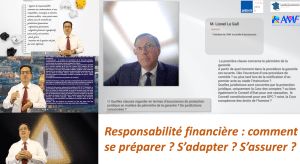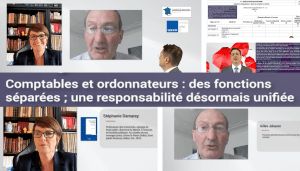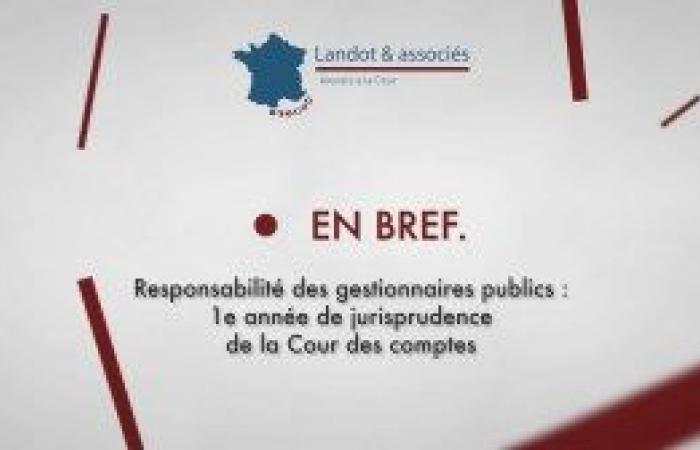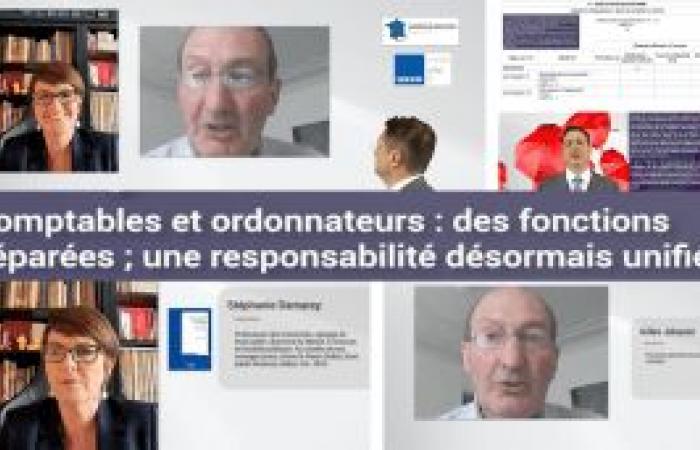Requesting a sum not due, as irregular compensation, will be, for the agent who obtains and manipulates it, and for the mayor who knowingly grants it:
- still an illegality
- generally a sum to be paid (for an amusing application to job allowances, see CAA Paris, June 28, 2017, no. 16PA01136)
- quite often an offense, generally that of embezzlement
See ici a video about this
Sources : article 432-10 of the penal code; Cass. crim, November 27, 2002, n°02-81252; Cass. crim., May 30, 2001, no. 00-84102; Cass. Crime. March 21, 1995, req. No. 92-85916; Cass. crim, June 27, 2001, n°00-83739 and n°95-80784, Bull. crime. No. 162; Cass. crim., February 14, 1995, no. 94-80797; Cass. Crime. October 24, 2001, No. 00-88165; Cass. crim., June 29, 2016, no. 15-82.296; Cass. crim., December 7, 2022, n°21-83.354.
But it will also be, in the responsibility of public managers before the Court of Auditors, a financial offense: granting an unjustified advantage defined in article L. 131-12 of the financial jurisdictions code.
Let us recall this regime before seeing the scope of this new ruling, confirmatory in its principle… as well as in the idea that we can have of certain practices unfortunately.
With a simple maxim: if it is undue, a parting gift will be explosive on arrival.
I. Very… very summary reminders about the RGP
The reform of the financial responsibility of authorizing officers and accountants (known as RGP: responsibility of public managers) was not an overhaul: it was a small revolution in the public world, which gave rise to some very foundational first decisions .
After a complex design between 2018 and 2021, this new regime was, essentially, born from the finance law (no. 2021-1900 of December 30, 2021 of finances for 2022) then from ordinance no. 2022-408 of March 23, 2022, followed by Decree No. 2022-1604 of December 22, 2022.
The big shift took place on January 1, 2023, with many consequences for actors in the public world.
Before this reform (and excluding other types of liability, including disciplinary, criminal, etc.):
- certified (or de facto) public accountants had to compensate for any shortfall in the accounts (debit procedure under personal and pecuniary responsibility (RPP)
- authorizing officers (well… some of them, as well as accountants at least in theory) could be brought before the Court of Budgetary and Financial Discipline (CDBF, an institution sitting at the Court of Auditors and rendering a few decisions per year).
It is this second regime which was chosen to inspire this unified financial responsibility regime (a list of financial offenses therefore).
The new unified regime can judge, in the same movement, the two actors in the financial chain:
- authorizing officers, excluding elected officials (apart from a few details), without it being fully known whether the Court will consider as such executors who in reality attest to services provided or other decisions triggering or subsequently validating, for example, a payment mandate
- the accountants, who over the course of the proceedings will therefore be able to pass the buck to the authorizing officers, and vice versa (and who may fall under this new responsibility even for facts prior to January 1, 2023 because the CDBF could also know — at least on paper — the responsibility of public accountants even if its conception and operation led to it actually dealing with authorizing officers).
The first decisions of the Court of Auditors, in 2023 and 2024, then, in January 2024, of the Financial Court of Appeal (CAF), within the framework of this new regime were therefore – necessarily – founding.
See for example:
- C. cptes, May 11, 2023, Alpexpo, n°Judgment n° S-2023-0604 aff 836 : see on this point:
- Court of Auditors, October 20, 2023, Landes Regional Transport Authority (RRTL), no. S-2023-1184. See our article on this subject:
- Court of Auditors, May 31, 2023, Municipality of Ajaccio, n°S-2023-0667.See previously CDBF, Dec. 20. 2001, n° 469 and CDBF, February 11. 1998, n°122-346. Financial offenses: 1° and 2° of article L. 131-14 of the Code of Financial Jurisdictions (CJF). See on this subject:
- in the same direction but going down quite low in the hierarchy, see: Court of Auditors, July 10, 2023, Sainte-Marie Hospital Center, no. S-2023-085, aff. #882
See then an important decision, of the Court of Auditors (notably with the fact that the importance of the financial stake can be used to qualify the seriousness of the serious management error while in theory these two criteria are distinct, since they are cumulative): Court of Auditors, November 24, 2023, no. S-2023-1382
See our article:
And on the first CAF ruling, see:
For a recent case of liability, for a town hall SG, failure to transmit claims declarations to the insurer on time, see: Court of Auditors, October 7, 2024 COMMUNE DE SAINTE-EULALIE-EN-BORN (LANDES), n ° S-2024-1305, case no. 40
Watch a longer video (25 mins 16) retracing the case law of 2023:
OTHER VIDEOS (AMONG OTHERS, BECAUSE WE HAVE MADE A LOT ON THIS EXCITING SUBJECT)
• How to prepare? Adapt? Get insurance? With a short presentation then the intervention of Mr. Lionel Le Gall, President of the AMF (mutual insurance company).
Let's try to answer these questions with this short video of 11 minutes 11, presented by Me Eric Landot before an interview with:

This is an extract from our weekly video column, “the legal 10′”, produced in partnership between Weka and the Landot & Associés firm: http://www.weka.fr
• Ppresentation the day after the order, with interventions by Ms. Stéphanie Damarey, University Professor, Associate Professor of Public Law and the honorary attorney general at the Court of Auditors Mr. Gilles Johanet
Here is another video, much more detailed on certain aspects but not addressing (unlike the one above) the questions of functional protection or not, nor those of insurance, nor that of “referrals of responsibility” between actors.
In this video of more than 18 minutes, here again, I present this diet, before speaking with:
- Ms. Stéphanie Damarey,
University Professor, Associate Professor of Public Law, director of the Master 2 in Public Finance and Taxation. His published works include Précis Dalloz, Droit public financier, Dalloz, Oct. 2018. - M. Gilles Johanet
honorary attorney general at the Court of Auditors

This is an extract from our weekly video column, “the legal 10′”, produced in partnership between Weka and the Landot & Associés firm: http://www.weka.fr
NB on the delicate question of functional protection, see:

II. Scope of this new judgment
The mayor of the commune of Bantzenheim had requisitioned the public accountant when the latter had refused the payment of irregular compensation to the former town hall secretary, upon the latter's retirement.
Indeed, although ceasing her functions on January 7, 2023, the town hall secretary was granted, for the year 2023, a monthly allowance for duties, constraints and expertise (IFSE) as well as a annual compensation supplement (CIA) for amounts not prorated to actual working time for the year 2023, contrary to the municipality's deliberation of January 25, 2022 establishing the compensation system taking into account functions, constraints, expertise and professional commitment.
She had also received compensation for the 70 days appearing in her time savings account while the municipality's deliberation of November 17, 2015 establishing the time savings account did not provide for any monetary compensation system for unused stored days.
The total net amount of compensation unduly received by the town clerk amounted to €12,415.91.
We can have a farewell drink, but the farewell gift was still a little strong in terms of coffee… and the fact that the mayor dared to requisition the accountant is beyond belief.
It is therefore no surprise that the Court of Auditors saw this as constituting the financial offense of granting an unjustified advantage defined in Article L. 131-12 of the Code of Financial Jurisdictions (CJF).
It will be recalled that during the time of the late CDBF, such actions were already censored. Let us cite for example this decision:
“11. The payment of these additional remuneration calculated from a step reclassification to which the attached doctors could not claim, not benefiting from the required seniority in the public service, in disregard of the aforementioned provisions of the code of public health, constitutes an infringement of the rules for executing expenditure provided for in Article L. 313-4 of the Financial Jurisdictions Code. In addition, these wrongful actions constitute an unjustified advantage within the meaning of Article L. 313-6 of the Code of Financial Jurisdictions, granted to the practitioners concerned and resulting in financial damage for the CH de Chauny in the amount of the undue payments made. .”
Source: CDBF, January 20, 2021, no. 246-824
Although this point is confirmatory… both from the jurisprudence of the Court and from the practice, unfortunately, of many rural municipalities, we will not be surprised to see that the offense could have been constituted by the lack of control and discernment of the mayor who trusted, too blindly, in his town hall secretary.
Because of the total trust he placed in him, the mayor never exercised control over the conditions and terms of remuneration that his town hall secretary determined for herself.
The Court also noted the decisive action of the former town hall secretary, after her termination of office, to obtain the payment of undue remuneration and the signing by the mayor of an order for the requisition of the accountant.
Consequently, the Court of Auditors considered that the offense defined by article L.131 12 of the financial jurisdictions code, in force since January 1, 2023, was constituted and attributable to the mayor of the municipality and to the former town hall secretary.
The mayor was sentenced to a fine of €5,000 and the former town hall secretary to €10,000, amounts lower than the maximum penalty for this offense, which can be up to six months' remuneration in application of the second paragraph. of article L. 131-16 of the financial jurisdictions code.
When setting the quantum of the fine, the Court took into account as an aggravating circumstance for the mayor his experience as a local elected official at the municipal and intercommunal level.
Here again, it is classic that the financial judge, like the criminal judge elsewhere, bases himself for lack of anything better on the number of years of seniority of the elected official in his functions, to assess his knowledge of the subject. It makes sense. But when you know certain towns, it can only make you smile.
The Court, however, considered that the investment of this elected official in the municipal expenses of a small town with few staff mitigated his responsibility.
For the town hall secretary, the Court considered that her long experience in the territorial civil service and her membership in a category A body constituted aggravating circumstances in that she could not ignore the irregular nature of the payments and the consequences of the act of requisition. Which is hardly contestable.
Source :
Court of Auditors, November 14, 2024, COMMUNE DE BANTZENHEIM (HAUT-RHIN), no. S-2024-1396, case no. 29

With a simple maxim: if it is undue, a parting gift will be explosive on arrival.

I like this:
I like loading…












